When it comes to sharing your life with a furry friend, it’s no secret that dogs have their eyes—and noses—on more than just their kibble. As much as you might love indulging in your favorite human foods, your canine companion is probably right there, ready to pounce on any crumbs or morsels you might drop. While some foods are safe to share in moderation, others can spell trouble for your pup’s health. Nonetheless, there are certain snacks and meals that dogs just can’t resist, no matter the risk. Whether it’s the tantalizing aroma or the irresistible texture, these 13 human foods are ones that dogs will often go the extra mile to steal.
1. Bacon
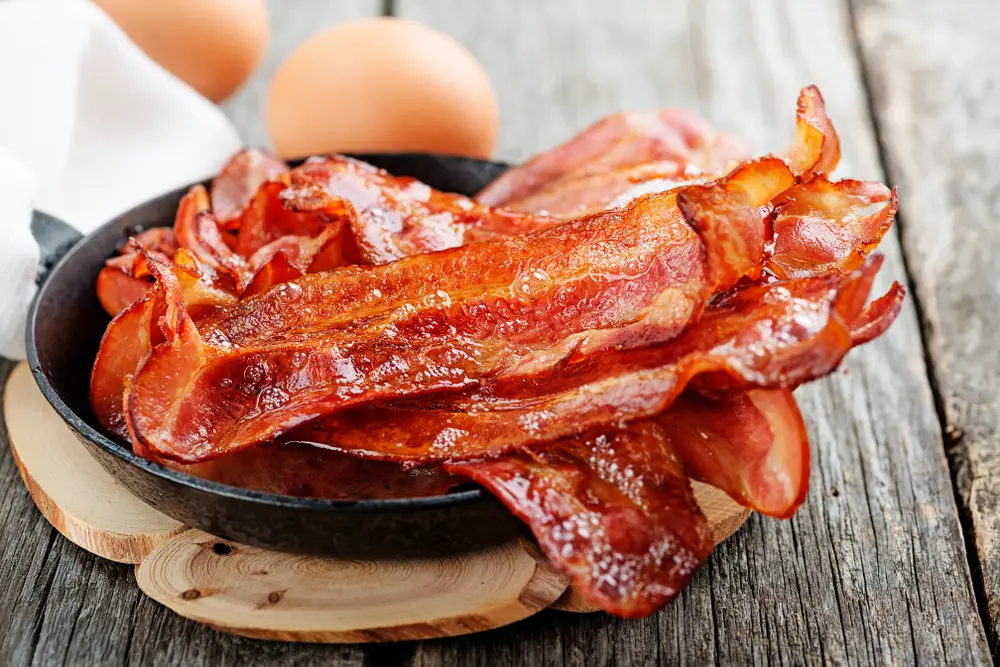
Bacon is a guilty pleasure for many people, and it’s no different for dogs. The savory, smoky aroma can lure even the most well-behaved pup into mischief. Many dogs will resort to expert-level sneaking around to snag a piece of this crispy delight. However, the high salt and fat content can lead to health concerns such as pancreatitis in dogs. According to the American Kennel Club, it’s best to keep this breakfast favorite away from your furry friend.
The sizzle of bacon in the pan is enough to make your dog sit up and take notice. They may hover around the kitchen, eyes pleading, hoping that a piece will fall to the ground. Some dogs even learn to open cabinets just to get at that heavenly smell. It’s important to maintain vigilance and store cooked bacon in a safe place. Remember, a moment of indulgence isn’t worth the potential health risks for your dog.
2. Cheese
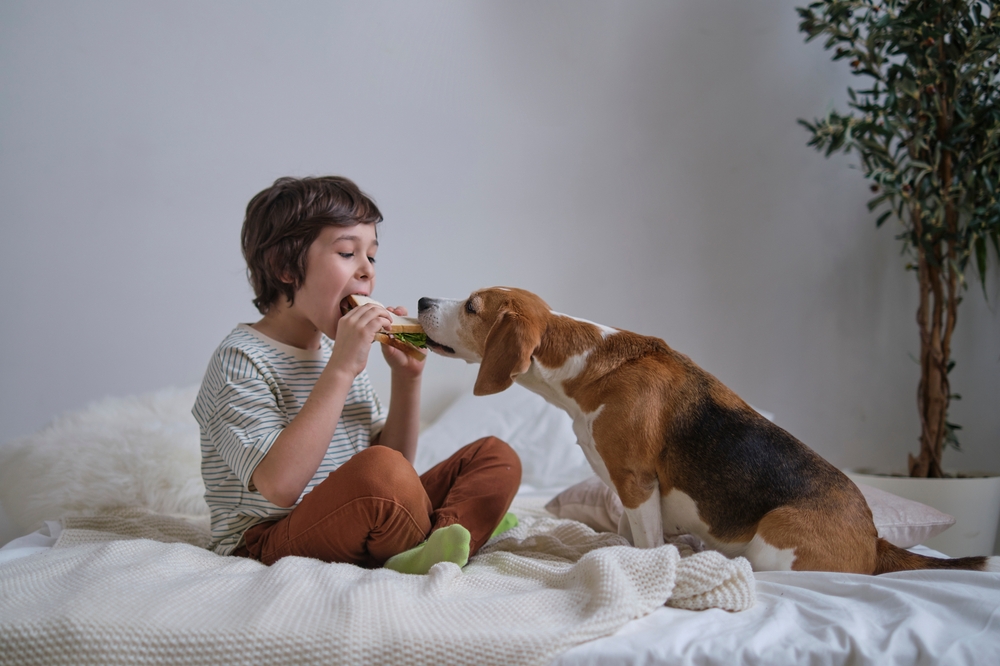
Cheese is another human food that dogs find irresistible, likely due to its rich flavor and creamy texture. Whether it’s cheddar, mozzarella, or Swiss, many dogs are quick to beg for a slice. While cheese can be a great motivator for training, it should be given sparingly because of its high fat content. Overindulgence can lead to weight gain and upset stomachs. If you do opt to share, choose low-fat options and keep the portions small.
Dogs seem to have a sixth sense when it comes to cheese. You might notice your pup suddenly materializing at your feet the moment you open the fridge. Some dogs go so far as to nudge wrappers off the counter in hopes of landing a tasty prize. The key is to be mindful of how much you’re giving and to know your dog’s tolerance for dairy. Moderation is crucial, and a little goes a long way in keeping your dog happy and healthy.
3. Peanut Butter
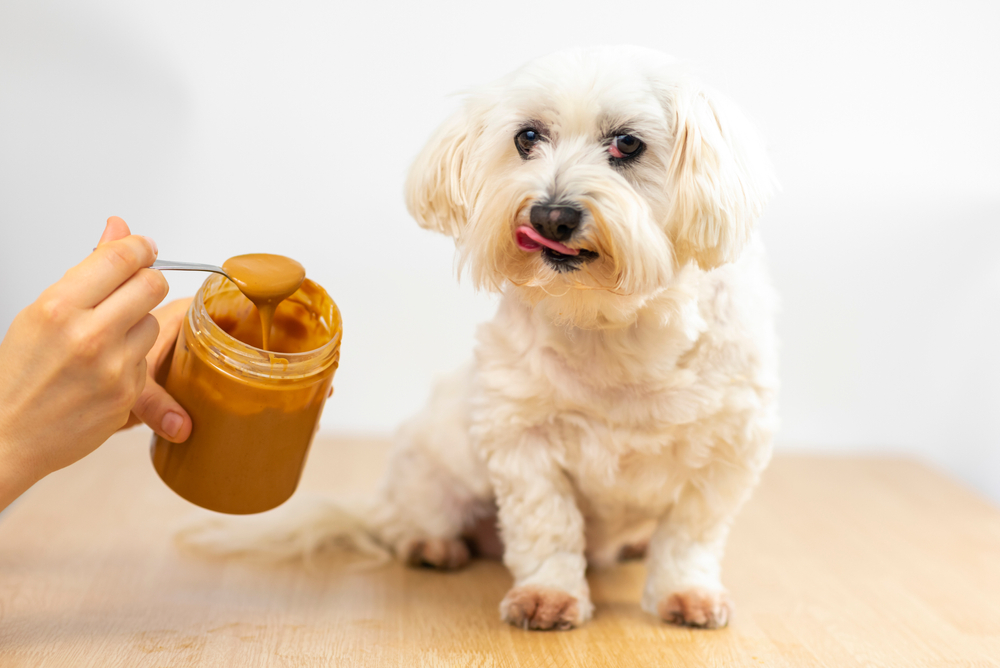
Peanut butter is a staple in many households, loved for its creamy texture and nutty flavor. Dogs, too, are not immune to its allure, often going to great lengths to snag a taste. It’s a popular choice for stuffing into toys or disguising medication due to its stickiness and flavor. However, it’s essential to check for xylitol, a sugar substitute that’s toxic to dogs. As noted by the American Veterinary Medical Association, xylitol can cause a dangerous drop in blood sugar and should be avoided.
The joy that dogs exhibit when they taste peanut butter is almost contagious. You’ll find them licking their chops, savoring every last bit. This enthusiasm, though, can lead to overeating, so it’s crucial to limit portions. Choose a natural peanut butter with no added sugars or preservatives for a healthier option. Your dog will still appreciate the treat, likely begging for more with those irresistible puppy eyes.
4. Chicken
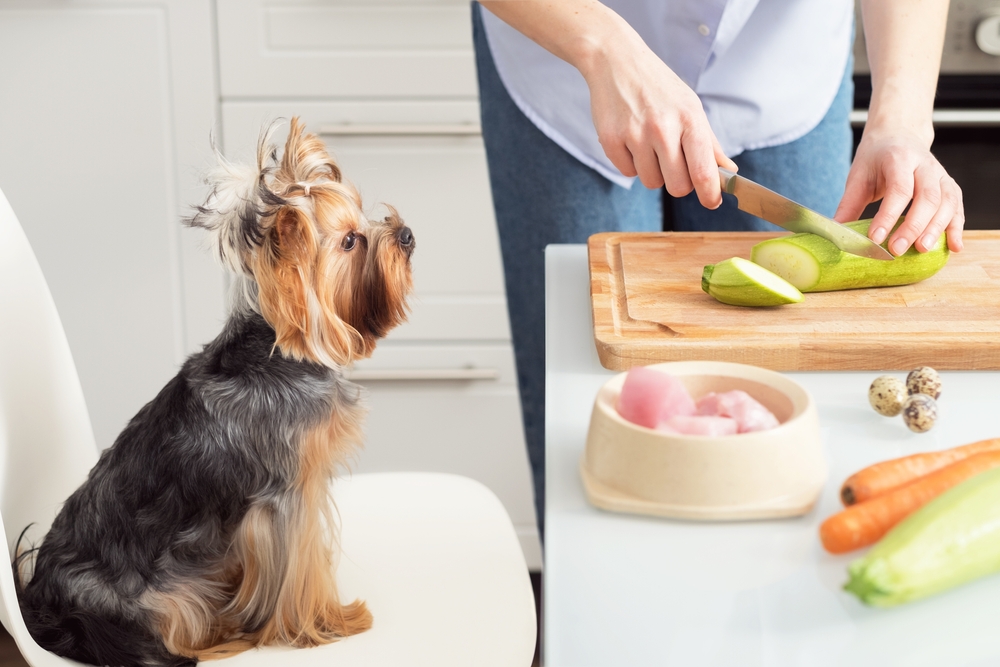
Chicken is often part of a dog’s diet, but that doesn’t stop them from trying to nab a piece from your plate. Its versatility and flavor make it a popular ingredient in both human and canine meals. Dogs seem to have a special radar for freshly cooked chicken, ready to swipe a piece at a moment’s notice. While plain, cooked chicken is generally safe, it’s important to remove any bones and skin. Seasonings or sauces can also pose health risks, so simplicity is key.
The allure of chicken is usually too strong for most dogs to resist. Whether it’s grilled, roasted, or boiled, the smell can send them into a frenzy. You might find them circling the dinner table, eyeing any unattended plates. It’s a good idea to serve your dog’s chicken separately, ensuring it’s free from any harmful additives. By doing so, you can enjoy your meal without a sneaky pup trying to steal your food.
5. Bread
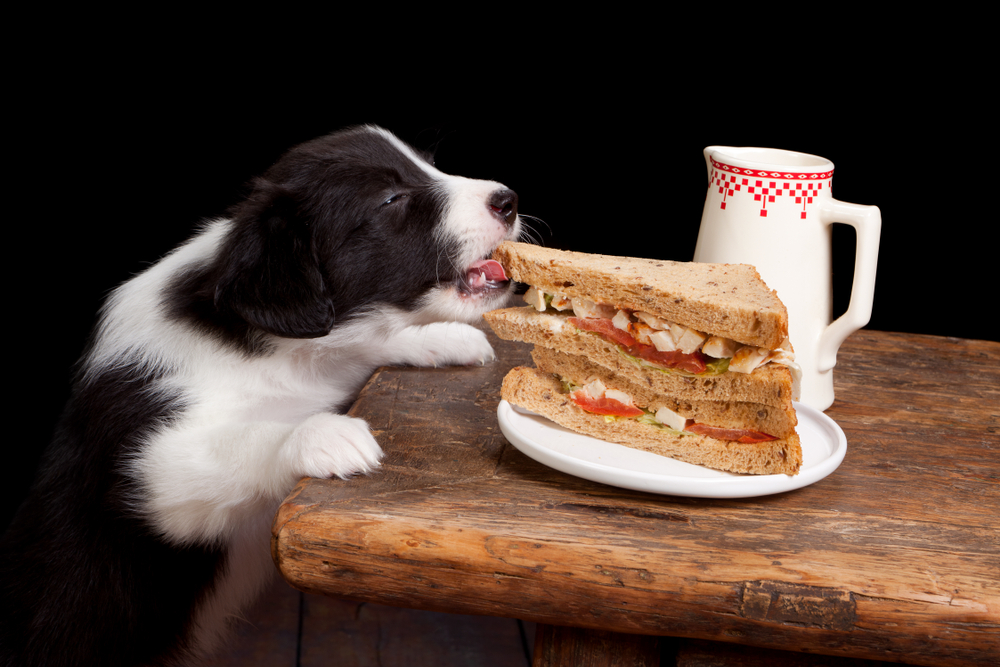
Bread might seem like a harmless treat, but for dogs, it’s a coveted snack that can lead to overeating. The soft texture and mild flavor make it an easy target for sneaky pups. Some dogs will even climb onto counters to get at a loaf left unattended. While plain bread isn’t toxic, it’s low in nutrients and can contribute to weight gain if given too frequently. According to PetMD, certain breads with raisins, nuts, or garlic are dangerous and should be avoided altogether.
The simplicity of bread seems to appeal to dogs, as they often find ways to grab a slice or two. From sandwich crusts to entire loaves, they’ll devour it all if given the chance. This is why it’s essential to keep bread out of reach, stored securely in a pantry or breadbox. Being mindful of what types of bread are in your home can also prevent accidental ingestion of harmful ingredients. Always prioritize your pet’s safety over their curiosity.
6. Eggs
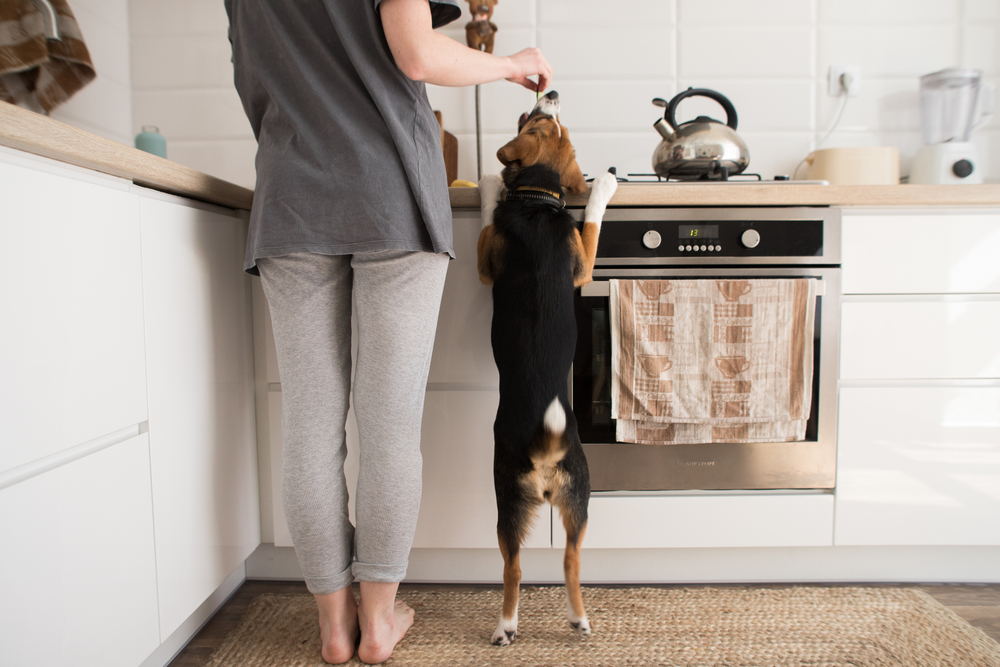
Eggs are another simple food that can attract dogs with their rich taste and nutritional value. A source of protein and vitamins, eggs are sometimes included in a dog’s diet. However, when cooked for human consumption, they often include butter or oils that aren’t ideal for dogs. A plain, boiled egg can be a healthy treat, but be wary of sharing your scrambled eggs. The added fats can contribute to health issues if consumed in excess.
Dogs are known for their keen sense of smell, and the aroma of a cooking egg can be particularly enticing. They may sit patiently by the stove, tails wagging in anticipation. Some might even attempt to jump up to the counter to get a closer look—or taste. It’s important to be cautious and only share eggs that are plain and properly cooked. This allows your dog to enjoy the benefits without the added health risks.
7. Steak
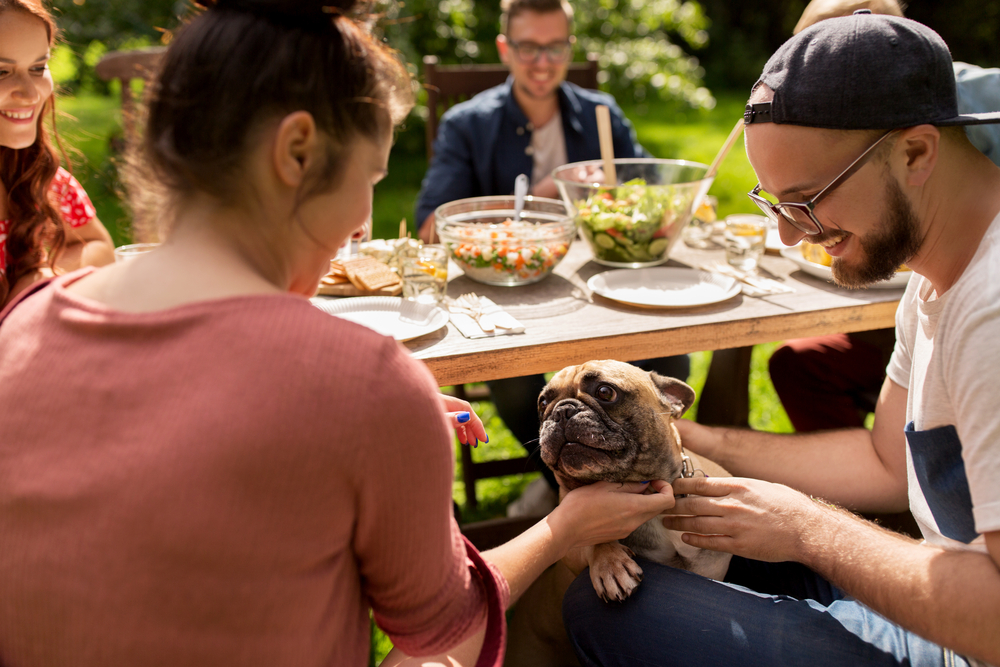
Steak is a luxury for many people, and it’s no surprise that dogs find it equally appealing. The juicy, savory meat is often enough to make any dog drool in anticipation. However, the rich fat content and potential seasonings can make it less than ideal for frequent sharing. Dogs are adept at sneaking bites when you’re not looking, making vigilance essential. According to the ASPCA, plain cuts with no added spices are safer, but moderation is still key.
A perfectly cooked steak can send your dog into a frenzy, desperate for just a morsel. They’ll often watch you intently, waiting for an opportunity to snatch a bite. The key is to indulge them sparingly and to ensure the meat is free of harmful seasonings. A small piece of unseasoned steak can be a delightful treat for your dog, but it’s important to resist the urge to share too much. Balance is crucial for maintaining your pet’s health.
8. Popcorn

Popcorn can be a fun, shared snack during a cozy movie night, but it’s not always the best choice for dogs. The buttery, salty flavor can entice your pup to beg for more, but it’s these very ingredients that can cause health issues. Unbuttered, unseasoned popcorn can be a low-calorie treat when given in moderation. However, it’s easy to accidentally share pieces that are too salty or greasy, leading to potential stomach upset. Keep a close eye on your dog and only offer plain popcorn to avoid any issues.
The sound of popping kernels might draw your dog into the kitchen, eager to see what’s cooking. They’ll likely sit patiently by your side, waiting for you to share. While it’s tempting to toss a few pieces their way, it’s essential to ensure those pieces are free from added flavors. Even a small amount of butter or salt can be harmful, so vigilance is crucial. By sticking to plain popcorn, you can safely share this snack with your furry friend.
9. Carrots
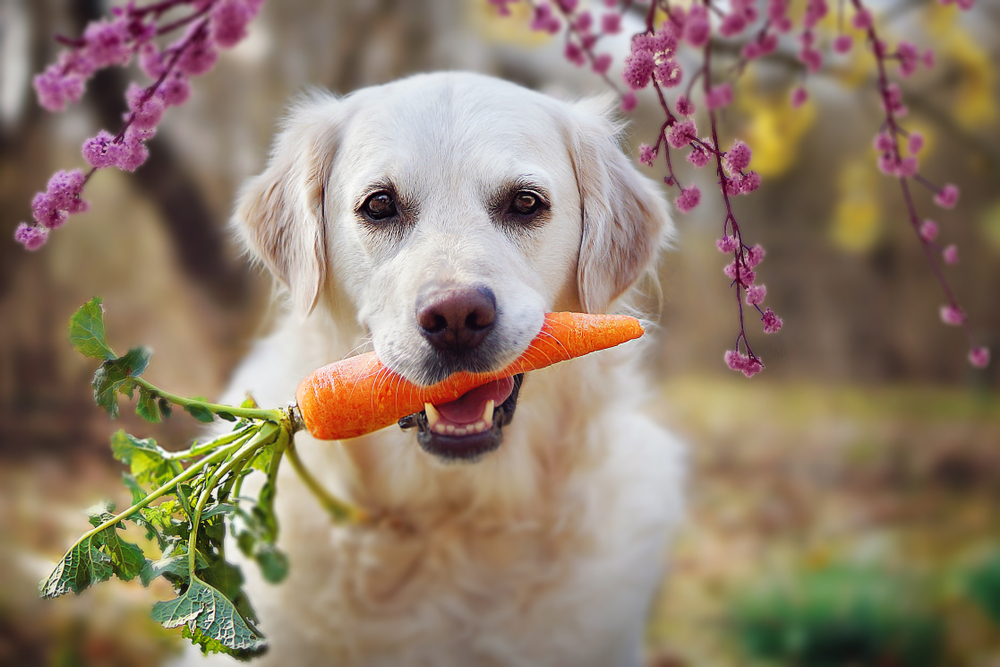
Carrots are a crunchy, healthy snack that many dogs enjoy. Packed with vitamins and fiber, they offer nutritional benefits without added calories. Dogs often find the crunchy texture irresistible, making them a great option for training treats. While carrots are generally safe, it’s important to cut them into manageable sizes to prevent choking. Moderation is key, as too many carrots can lead to digestive issues.
The bright color and satisfying crunch of carrots often capture a dog’s attention. You might find your pup eagerly watching as you prepare a salad, hoping for a piece to drop. Some dogs even enjoy them frozen as a refreshing treat on hot days. It’s important to introduce carrots gradually to ensure your dog doesn’t have any adverse reactions. By keeping portions in check, you can offer a healthy snack that your dog will love.
10. Apples
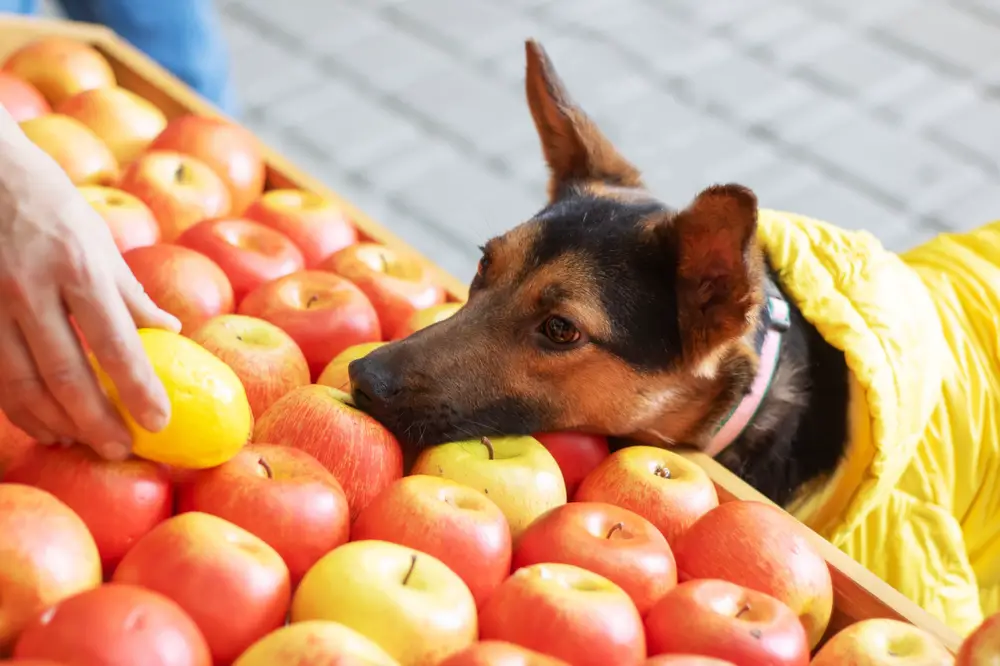
Apples are a sweet, juicy treat that many dogs are quick to devour. They provide vitamins and fiber, but it’s crucial to remove the seeds and core, which contain cyanide. Sliced apples can be a refreshing snack, especially on warm days. However, like all fruits, they should be given in moderation to prevent digestive upset. The natural sugars and fiber content can be beneficial, but balance is important.
Dogs often seem drawn to the crisp, juicy nature of apples, making them a popular choice for a healthy treat. You might find your pup watching intently as you slice one, hoping for a taste. By offering small, seedless slices, you can safely share this fruit with your dog. Some dogs even enjoy apple slices as a refreshing treat straight from the fridge. Always ensure the apples are free from seeds and core before offering them to your pup.
11. Ice Cream
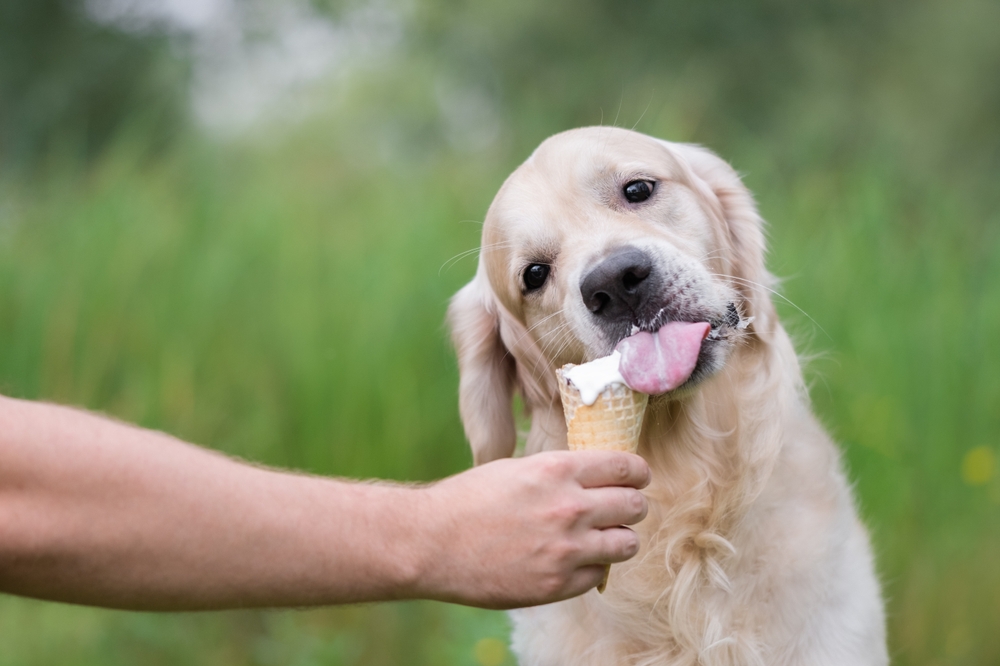
Ice cream might be a delightful treat for you, but it’s a risky indulgence for dogs. The sugar and dairy content can lead to digestive issues, even in small amounts. Dogs are often drawn to its creamy texture and sweet taste, but it’s important to exercise caution. Some ice cream flavors contain xylitol or chocolate, both of which are toxic to dogs. A safer option is to offer dog-safe frozen treats or plain, unsweetened yogurt.
The allure of ice cream is strong, particularly on hot days when a cool treat is most tempting. Your dog might sit eagerly beside you, eyes pleading for just a small taste. It’s crucial to resist the temptation to share, as even a little can cause digestive upset. Instead, look for specially formulated dog ice creams or make your own frozen treats. This way, your pet can enjoy a cool snack without the associated risks.
12. Pizza

Pizza is a crowd-pleaser at parties, and it seems dogs are no exception to its appeal. The combination of cheese, sauce, and crust creates an aroma that’s nearly impossible to resist. Dogs might sneak a bite if a slice is left unattended, but the toppings can pose serious health risks. Ingredients like onions, garlic, and certain spices are toxic to dogs, making pizza a food to avoid sharing. If your dog consumes pizza, watch closely for any signs of distress.
The sight of a pizza box can instantly grab a dog’s attention, drawing them in with the promise of tasty leftovers. They’ll often hover near the table, hoping for a dropped crust or unattended slice. It’s essential to remain vigilant and keep pizza out of reach, as the potential for harm is significant. Instead, consider making a dog-friendly version using safe ingredients. This way, your pup won’t feel left out during pizza night.
13. Chocolate

Chocolate is perhaps the most infamous of forbidden foods for dogs. While it’s a beloved treat for people, it’s toxic to dogs, due to theobromine and caffeine content. Even small amounts can lead to serious health issues, making it crucial to keep chocolate out of reach at all times. Dogs might be drawn to its smell and taste, but the risks far outweigh any momentary pleasure. If your dog ingests chocolate, contact your veterinarian immediately.
The rich aroma of chocolate is often enough to capture a dog’s attention, despite its harmful effects. Dogs might dig through bags or climb onto counters in search of this forbidden treat. It’s important to educate everyone in your household about the dangers and ensure that chocolate is always stored securely. By being proactive, you can prevent accidental ingestion and keep your dog safe. Always prioritize your pet’s well-being over their curiosity.
